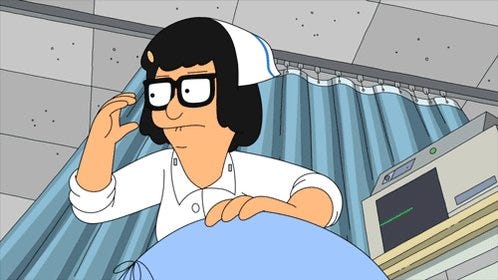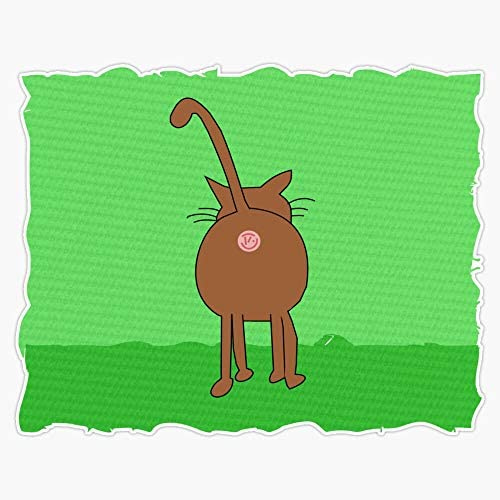No ands, ifs, or butts
Meet your cat's anal glands
Hello, hoomans!
Happy 2023! Let's start the year right: channel our inner Tina Belchers, and talk butts.
Adorable, stinky cat butts to be specific, of course. And even more specifically, the weird, wonderful (?) world of feline anal glands. They're kinda gross, but remarkably important to the health and well-being of your cat fam, and definitely not something enough of us humans know much about.
So, let's get into 'em (not literally, you know what I mean.
Feline anal glands are small sacs located at about the 4 o'clock and 8 o'clock position around your cat's anus, under their skin. The sacs are connected to two small openings via tube-like ducts, and you can see the openings, if you lift their tail and look -- you'll spot two very small spots right on the very edges of the skin of their butthole.
The anal glands produce dark, highly odored (like, a lot of smell) liquid that is, believe it or not (believe!) close in chemical composition to the secretions produced by skunks in their scent glands. They fill up regularly with this stink broth, which is used to help cats mark territory. When threatened, cats can even squirt out their anal fluid, as a way to try and intimidate their enemies.
Most of the time, we don't really ever have to think about our cat's lil stank sacs. When they poop, pressure squeezes on these glands, and they express a small amount of this fluid along with their poop. This keeps, uh, the smelly juice flowing naturally -- they empty the sacs gradually each time they lay a turd, and the sacs refill slowly.
Now, occasionally, even an otherwise healthy cat may develop some anal gland issues. If they are constipated or, conversely, have diarrhea, they won't have enough pressure on the sac to squirt out collected fluid. In this case, the gland juice may thicken and build up or, when the cat finally has a normal crap, come shooting out in their litterbox in one huge, extremely unpleasant-smelling stream (you'll know it if this happens).
If they can't express the anal liquid, they will have to have their anal gland manually "milked" by a vet or vet tech. This is a pleasant experience for no one, including your cat, but is important -- clogged, impacted anal glands can develop into a serious health issue, not to mention misery for your cat.
Do NOT, I repeat, DO NOT think you can express your cat's anal glands yourself, regardless of what YouTube videos may tell you. And, while many pet groomers state they can and will express your kitty's anal glands for you (for less cost than a vet), please don't do that either -- unless your groomer also has some veterinary training. I mean, aside from the risk, imagine yourself in your cat's place.
I'm serious.
Would YOU want your roommate or hairdresser poking around inside your anus?
Didn't think so.
So, don’t do that to your bestie, either.
So, how will you know if your cat's butt smell bags are clogged or impacted? Here is one issue in which your cat will not be subtle in asking for help. They will:
Scoot across the carpet or your bed, in a sitting position, dragging their butt as they go
Weep/yelp/scream/howl before, during, and/or after using a litterbox
Obsessively lick and bite their whole anal area
Actually back their a$$ right up to your face to get your attention to the matter
If you notice these behaviors, like I said, make an appointment ASAP for your cat. Your vet will perform a rectal exam and see what's going on. It could just be a regular impaction, as I said, caused by being stopped up or runny stools (maybe a new diet?), or there may be something slightly more serious, like an abscess or a growth. Again, this won't be your cat's most favorite thing to happen at the vet, but there will be immediate relief for the afterwards -- so they will forgive you for the indignity pretty dang quick.
Now, if you get a “dump” of previously clogged pee-eww serum in the litterbox, after your cat was, unknowingly stopped up (this happens!) your cat has a big old poo…you’ll know it pretty dang quick. You will have to dump the whole litter contents and wash the litterbox to get rid of the smell. Pro-tip: nothing works better for this than plain, no-frills baking soda. Sprinkle a good amount in with the discarded litter, and then cover the bottom of the cleaned out litterbox, and wipe out with a paper towel dampened with warm water. If this happens as an isolated incident, be happy and move on — occasionally, like I said, a constipated cat will get some build-up, and when they go, it works it all itself out. If this happens more than once, especially, say, within a single month, do take your cat to see the vet for a check-up.
Anyway, that’s our tour through the wonderful world of kitty tushies. I hope you found this as weirdly adorable as we did.
Note: I'm not a medical professional. As always, you know your cat best. Follow your common sense and consult with your veterinarian. If you need low-cost veterinary services, the Humane Society has some options, but you can always call 211 for your area (in the US) to find out about clinics near you.
Next issue, we’re still deciding on next issue’s topic. I just learned a kinda cool fact (the hard way), so that may derail our original plans. But we’ll see. Either way, it will be more fun than a basket of kittens — of course.
Until then,
The Clowder and their human




